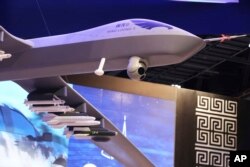Acting U.S. Defense Secretary Pat Shanahan has sounded the alarm that the U.S. military "is not moving fast enough to stay ahead" of rivals China and Russia in space.
Speaking at the Space Symposium in Colorado Springs, Colorado, Shanahan said "China and Russia have weaponized space with the intent to hold American space capabilities at risk."
He then warned that the U.S. is "not capable of tracking" some of China's rapid advancements in space weapons, particularly in hypersonic weapons.
Threats from competitors in space can target many critical aspects of the United States' $19 trillion economy, from GPS navigation to cellphone usage.
"The next major conflict may be won or lost in space," Shanahan said Monday. "We are not going to sit back and watch. We are going to act."
The acting defense secretary said that the Trump administration's proposed Space Force will allow the military to more effectively organize, train and equip a military force of about 15,000 to 20,000 for this war fighting domain.
The new military branch will cost each American about $1.50 per year, Shanahan said, a key point he will likely repeat Thursday when he appears in front of the Senate to defend the military's plan for creating a Space Command, Space Development Agency and eventually a Space Force.
The Pentagon has been defending its budget proposal on Capitol Hill for weeks. Some lawmakers have been skeptical of the Department of Defense's stated need for a separate Space Force amid its record-setting request for increased funding.
The U.S. currently spends more on defense than any other country.
"We are starting now because we refuse to fall behind. We can outpace our competitors and make it impossible for them to contest our dominance in space," Shanahan said






